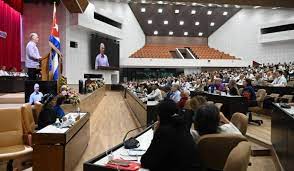
The IV Conference on the Nation and Emigration
On November 18 and 19, nearly 400 Cubans residing abroad met in Havana to hold the IV Conference on the Nation and Emigration, organized by the Cuban government to report on the situation in the country and share opinions on those issues that most interested the participants.
There are very few countries that organize meetings of this type, especially when the guests have to cover their expenses in Cuba. To make matters worse, they are not designed to meet everyone’s expectations, since, although they can serve to raise awareness of certain concerns and contribute to their solution, these types of meetings are generally impractical for solving individual problems of the participants. The objective is to project the policies related to the call, and form the necessary consensus to implement them. This was the success of the conference.
Conceived as a continuity of the so-called “Dialogue of 1978,” which under the auspices of Fidel Castro transformed the policy implemented until then towards emigrants, the IV Conference, which had to wait almost twenty years to give continuity to the third, had the challenge to promote the interest of Cubans residing abroad in integrating to a greater extent into national life, as well as clearing the way to facilitate this process by eliminating the objective and subjective obstacles that still exist in the Cuban bureaucratic fabric.
Surely, aware of the political capital involved in advancing a process that enjoys broad support among the population and constitutes a necessity to mitigate the most negative impacts of migration, President Miguel Díaz-Canel was present in most of the sessions of the conference, invited the participants to a reception at the Palace of the Revolution, and also to a cultural gala at the emblematic Martí Theater in Old Havana, as well as attending the conclusions of the event, in the presence of the country’s main leaders.
Perhaps the most important moment of his speech was when he stated: “On behalf of our people, I reiterate that the commitment to strengthen ties with Cubans living in any latitude of the world is invariable and irreversible.” A boost for a policy that has always encountered resistance in some strata of the Cuban government and political apparatus.
This conference took place at a particularly difficult time for Cuba, which is suffering the consequences of the pandemic, has to face the brutal impact of the United States blockade, and is going through a period characterized by high levels of popular dissatisfaction. One of its consequences has been the unusual increase in emigration in conditions that favor the most dissenting positions, fueled both by the facts and subjectivity that prompted them to emigrate, and by the hostile environment that they generally find in places where they migrate to, especially in the United States.
Conference participants reflected another reality, that of Cubans who have organized themselves in solidarity associations with Cuba, or express interest in doing business, joining activities carried out in Cuba, and collaborating with the life of the country. Everyone from those attending the ’78 dialogue to young people who were born long after that moment participated. They were from all over: Miami, Bilbao, Caracas, Shanghai or Johannesburg, to give an idea of the diversity of participation.
Although various studies show that, whatever their position towards the Cuban government, the majority of emigrants advocate family contact and other forms of getting closer to Cuban culture, it would not be true to affirm that those attending the conference represent the majority of the country’s emigrants, but to the segment most committed to the call to participate in national life and, in one way or another, to political struggles in defense of the country.
But the majority condition is not what matters most, what really matters is that they represented the interests of many people who, whatever their number, whether or not they participate in this type of events, have the right to be accepted by their country while recognizing the rights that emanate from their status as citizens, as established in the Constitution approved in 2019.
Also importants is taking advantage of these moments to raise awareness and perfect the implementation of a national policy that stimulates and makes possible the fulfillment of these rights to, from an inclusive will, advance on the path that leads to majorities. As Fidel Castro said in 1978:
“(The) link of that community, of the great mass of that community with the country, is a national type link. And I would say that we would begin to use that national spirit, in this case, with a positive sense and a revolutionary sense, and that one day, Cuba, the country, will have the support – listen carefully! – of the majority of that emigration. Or else we are not what we are, our country is not what it is, and our Revolution is not worth what it is worth.”

